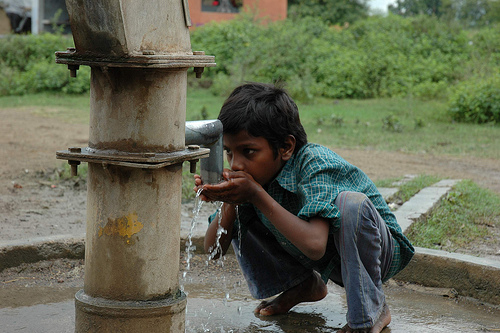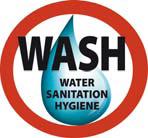/topics/sanitation
Sanitation
Sanitation models in Trichy Tamil Nadu
Posted on 22 Nov, 2014 10:30 AMA few weeks back I had the opportunity to visit a couple of partners in Tamil Nadu. These two partners are facing a difficult task—sanitation and hygiene implementation through community participation. One project is in the urban slums of Trichy while the other one is a rural project a few hours outside of Trichy. These communities have open defecation rates of 90%. The problem mostly lies on the women. Women feel embarrassed and ashamed to go out in the open, so as a result they only go in the early mornings or late at night—basically during pitch black. Menstrual Health is a topic that is only now being addressed with organizations developing their own branch of sanitary napkin production, sold cheaply to women in rural areas. In addition to the burden on women, open defecation pollutes water sources, thereby leading to diarrhea, one of the biggest killers of children in the developing world.
Inspiring progress- Learning from Exnora Green Pammals solid waste management partnerships in four localities
Posted on 22 Nov, 2014 10:30 AMThis booklet by Exnora Green Pammal (EGP) begins by highlighting the grave situation in relation to solid waste management in the country and the steps undertaken by the government to tackle this issue. The document presents a review of the efforts undertaken by EGP, an NGO based in Chennai, which has been implementing solid waste management projects with a variety of local bodies in accordance with the government’s rules.
India’s solid waste crisis is undermining the nation’s efforts to improve public health, protect the environment and stop climate change. India produces a staggering amount of municipal solid waste every day and the rate of production is expected to climb steadily as the nation becomes more populated, urbanised and economically developed.
Although the Indian government has enacted rules for management and handling of municipal solid waste, the results as per the year 2010 indicate that most localities have not fully complied with the rules and the situation has found to be getting worse day by day. Widespread, prolonged noncompliance with the rules and the rapid, highly-visible environmental degradation has led to calls for a changes in the nation’s waste management policy.
Rainwater harvesting initiatives in Bangalore - A paper by KSCST
Posted on 22 Nov, 2014 10:30 AMThis paper by AR Shivakumar of the Karnataka State Council for Science and Technology (KSCST), presented at a national seminar organised by ISRO at NIAS Bangalore in 2010, begins by highlighting the increasing problem of scarcity of water that the city of Bangalore has been experiencing in recent years and suggests a required plan of action for a sustainable water supply system in the city.
Water quality status of historical Gundolav lake, Kishangarh - South Asian Journal of Tourism and Heritage
Posted on 22 Nov, 2014 10:30 AMThis paper published in the South Asian Journal of Tourism and Heritage describes the water quality status of Gundolav Lake in Rajasthan, which was once used for drinking water as well as for recreational activities under the tutelage of the princely state of Kishangarh. This has now become a site of wastewater disposal and facing a critical threat for its sustenance.
Recent years have led to an increasing awareness of the importance of water bodies and the need for conservation of water bodies, especially freshwater wetlands. The Ramsar Convention (2002) identifies wetlands as the starting point for integrated water management strategies. This is because they are the source of fresh water, maintain the health of the water course and water bodies, have the capacity to supply water to meet the human needs and are a key to future water security.
Seven Steps to Hygiene- An educational booklet by Utthan
Posted on 22 Nov, 2014 10:30 AMThis document is an educational booklet on sanitation and hygiene published by Utthan, which works towards empowering women's groups to seek clean and adequate quality of water for all.
The booklet includes the details of seven steps that can be undertaken to attain sanitation and hygiene. The details have been explained in a manner that is simple and understandable and includes illustrations that are self explanatory and easy to follow.
The seven steps include:
- Use and protection of water sources
- Managing drinking water
UN General Assembly's resolution on water and sanitation as a human right
Posted on 22 Nov, 2014 10:30 AMThe recent UN General Assembly Resolution on declaring water and sanitation as human right is or can be a powerful impetus to securing universal access to water and sanitation for people everywhere. This is the most recent in a string of initiatives to advance the provision of these essential services. Beginning with the UN Decade of Water in the eighties, then the declaration of the Millennium Development Goals, and later the adoption of General Statement 15 by the Economic and Social Council of the United Nations in 2002 the recognition of the fundamental importance of water (and more recently sanitation) to life, health and well being has been accepted at the international level. In India, while there is no specific mention of the right to water in the Constitution, the Supreme Court in its judgement(s)has upheld this as part of the right to life. Some organizations are working to make this a fundamental right, to remove any ambiguity.

Boy drinking water from handpump in Guna, Madhya Pradesh - Handpumps and wells are still one of the major source of drinking water in India.
Photo credits: Anil Gulati
Floods drinking water contamination mining and waterbodies water bills water conflicts News roundup 17 August 2010
Posted on 22 Nov, 2014 10:30 AMFloods: lessons to be learnt from the massive flooding in Surat city
A report by IIM criticises the way in which dams are managed in the country and calls for the need to apply Management Science / Operations Research techniques and information technology to improve dam management and prevention of floods
Status of urban water supply sanitation and solid waste management CPHEEO data 2005
Posted on 22 Nov, 2014 10:30 AMThis link on the Central Public Health and Environmental Engineering Organisation (CPHEEO) website, presents data related to the status of the urban water, sanitation and solid waste management in India. The data includes information on:
- Status of water supply (physical)
- Status of urban water supply (financial)
- Status of urban sewerage/sanitation system
- Status of low cost sanitation
- Status of solid waste management
Data is included from different states in India namely Assam, Arunachal Pradesh, Karnataka, Gujarat, Maharashtra, Mizoram, Pondicherry, Sikkim and Tamilnadu respectively.
Deaths due to water pollution
Posted on 22 Nov, 2014 10:30 AMDeaths due to water pollution occur mainly as a consequence of drinking of contaminated water. The common diseases caused by consumption of contaminated water are Cholera, Viral Hepatitis, Enteric Fever (Typhoid) and Acute Diarrhoeal Diseases (ADD).
The number of deaths reported State-wise on account of Cholera, Viral Hepatitis, Enteric Fever (Typhoid) and Acute Diarrhoeal Diseases (ADD) for the years 2007, 2008 and 2009 are given in Annexure – I-III.
India WASH forum enewsletter Update 13 July 2010
Posted on 22 Nov, 2014 10:30 AMWe see this newsletter as a platform for independent credible voice in the water and sanitation sector. Our emphasis is on bringing together critical news and information with analysis. In this issue we share news and analysis on topical issues and developments.
The Department of Drinking Water and Sanitation(DDWS) has simultaneously invited inputs to Discussion Papers on Drinking Water and Sanitation, circulated on Solution Exchange. Inputs given by India WASH Forum, on this, is enclosed in this Update. We have pointed out the missing elements of sanitation improvement strategy that include, criticality of providing water as an inseparable component to household sanitation, the tendency to see behavior change as a lifestyle issue and not linked to the hardware components, peoples livelihoods and living conditions. Suggestions for what needs to be done to strengthen the implementation mechanism of the flagship sanitation programme(TSC) and partnerships.






